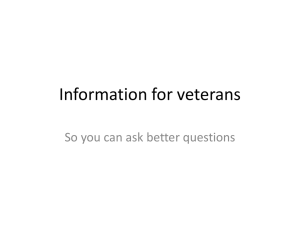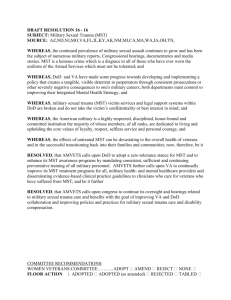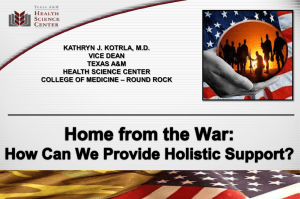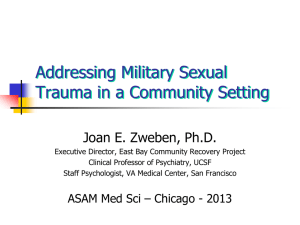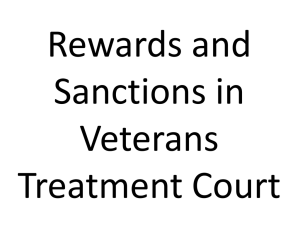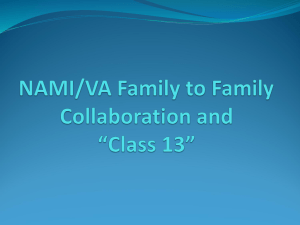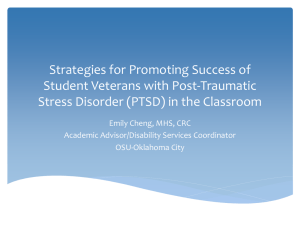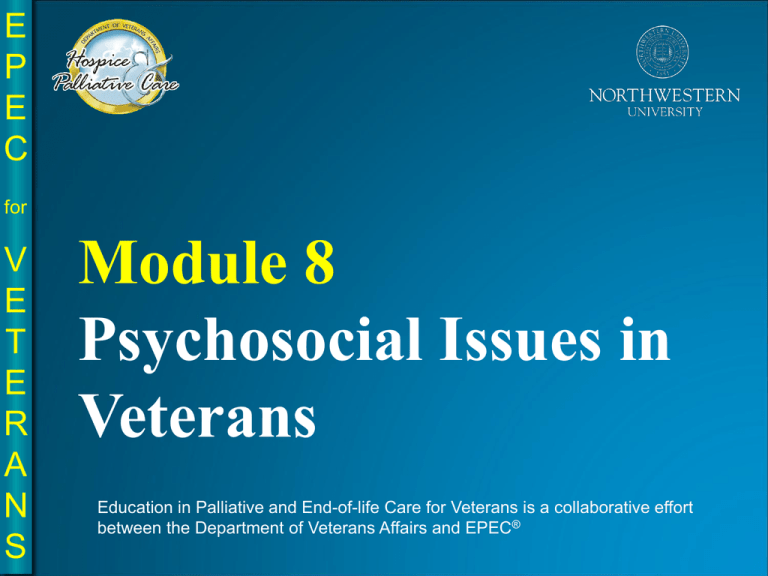
E
P
E
C
for
V
E
T
E
R
A
N
S
Module 8
Psychosocial Issues in
Veterans
Education in Palliative and End-of-life Care for Veterans is a collaborative effort
between the Department of Veterans Affairs and EPEC®
Acknowledgement
The slides in this module were
produced in cooperation with the
Veterans Advisory Council and a
committee of the National Hospice and
Palliative Care Organization.
Objectives
Summarize the basic characteristics
of four important psychosocial issues
in Veterans
Assess these issues in Veterans
Identify resources available to help
manage these issues
Clinical case
Disclaimer
The problems discussed in this
overview are complex. It is beyond the
scope of this presentation to give you
the skills to treat them. Consultation
with or referral to a qualified mental
health professional is the best approach
to addressing the needs of Veterans
with mental health problems at end of
life.
Post traumatic stress
disorder (PTSD)
What is PTSD?
An anxiety disorder that can occur
after a traumatic event
Examples of traumatic events include:
combat or military exposure
child sexual or physical abuse
sexual or physical assault
serious accidents, such as a car wreck
natural disasters
PTSD prevalence
About 30% of men and women who
spent time in war zones experience it
An additional 20 to 25% experience
symptoms sometime in their lives
More than half of all male Vietnam
Veterans and almost half of all female
Vietnam Veterans have experienced
"clinically serious stress reaction
symptoms”
Consequences of PTSD …
Elevated mortality for Vietnam
Veterans
Increased rates of substance abuse
Increased psychosocial problems
… Consequences of PTSD
Increased medical diagnoses
circulatory and musculoskeletal
conditions
poorer health quality of life
Greater pain intensity and pain
interference in functioning
PTSD: What to look for
Three key symptom clusters
reliving the event
avoiding reminders of the trauma /
feeling numb
feeling anxious or “keyed up”
Screening tools can be used to refer
to a mental health professional
Primary care PTSD screen . . .
In your life, have you ever had any
experience that was so frightening,
horrible, or upsetting that, in the past
month, you:
Have had nightmares about it or thought
about it when you did not want to?
YES / NO
Tried hard not to think about it or went out
of your way to avoid situations that
reminded you of it ?
YES / NO
. . . Primary care PTSD screen
Were you constantly on guard,
watchful, or easily startled?
YES / NO
Felt numb or detached from others,
activities, or your surroundings?
YES / NO
Death/illness as a PTSD
activator
How can PTSD impact EOL care?
death / illness as a PTSD activator
challenging social ties, incl. clinicianpatient
delirium or flashback
medication issues
Goals of care to include reduction in
PTSD symptoms
Military Sexual Trauma
Definition
Sexual assault or repeated,
threatening acts of sexual
harassment that occurred while in
the military
Includes any sexual activity where
someone is involved against his or
her will
Both men and women experience
MST
Examples of MST
Pressured into sexual activities
e.g., threats of consequences for refusing
to be sexually cooperative; implied better
treatment in exchange for sex
Unable to consent to sexual activities
e.g., intoxicated
Physically forced into sexual activities
More examples of MST
Unwanted sexual touching or grabbing
Threatening, offensive remarks about a
person’s body or sexual activities
Threatening and unwelcome sexual
advances
MST facts
Higher rates among women but are
about equal numbers of male and
female survivors due to male-female
ratio within military
Sexual trauma is more likely to result
in symptoms of PTSD than are most
types of trauma, including combat
Implications of MST …
Interactions with healthcare providers
can be complicated for Veterans who
experienced MST because the
clinician relationship can resemble
some aspects of the victim–
perpetrator relationship
e.g., power differential, being in physical
pain, physical exposure and touching of
intimate body parts, feeling a lack of
control over the situation
… Implications of MST
Exams and procedures are intrusive
and can physically recreate some of
the sensations a Veteran experienced
at the time of the sexual trauma
because of this, providers need to employ
extra sensitivity and care when working
with Veterans who experienced MST
Saxe and Frayne 2003
Some psychological
sequelae
PTSD
Depression
Substance use disorders
Panic disorder
Generalized anxiety disorder
Suicide
Eating disorders
Some physical sequelae
Chronic pain
low back pain
headaches
Gastrointestinal
irritable bowel syndrome
Gynecologic
menstrual disorders
pelvic pain
Screening and connecting to care
VA policy that all Veterans must be
screened for experiences of MST using the
one-time clinical reminder in CPRS
Universal screening is good clinical
practice
many patients do not spontaneously disclose a trauma
history. Asking about MST can be the first step in getting
them the help they need
understanding that a patient has a history of MST may
provide context for his or her presenting problems
knowing that a patient has experienced MST helps the
provider adapt care appropriately
Don’t be afraid to ask
Studies have shown that most sexual
trauma survivors favor routine screening
for sexual trauma and other forms of
interpersonal violence
However, it’s important to be sensitive to
barriers to disclosure
shame, especially for men
anxiety about how others will view them,
particularly if they have had previous
negative experiences disclosing
Examples of triggers…
Touch to chest, abdominal, groin,
pelvis, buttock, back or neck
Insertion of enemas, meds,
thermometers, feeding / breathing
apparatus
Oral care
Assisted transfers
... Triggers
Washing of the patient’s body by
others
Applying lotions or oils
Soft or other restraints including
chemical restraints
Tips
Patient education
Asking permission and offering to
stop if patient requests
Language - use nonthreatening terms
Anticipate and prepare
Responding to disclosure
Respond with empathy
“I’m sorry that this happened to you”
“I am here to listen to your story”
Ensure privacy
Listen if you are able or find someone
who can
Know your limitations
The role of VA
All treatment for mental and physical
health conditions related to the MST is
provided free of charge
Service connection or documentation
are not necessary
This may be true even if the Veteran is
ineligible for other VA services
Where to find help
Contact the MST Coordinator at your
local VA Medical Center or the MST
Specialist at your local Vet Center
To locate facilities online go to:
www.va.gov or www.vetcenter.va.gov
Visit
www.mentalhealth.va.gov/msthome.asp
Call 1-800-827-1000 – VA’s general
information hotline
Substance use disorder
Background ...
Of Veterans who access VA health
care system each year, approximately
a ½ million are diagnosed with
substance use disorders (SUD)
Prevalence of heavy drinking and
other substance use are at least as
high among Veterans compared to
non-Veterans
... Background
Pain, depression and other mental
conditions are associated with
increased likelihood of substance use
Alcohol and other substance use can
interfere with effective palliative care
(e.g., adherence)
SUD implications for
end-of-life care
Pain management becomes complex
Potential high tolerance for pain
medications
Choose medications for palliation that
minimize adverse drug-drug
interactions
How to help ...
Ask about current substance use and
implications for pain management
Adopt a nonjudgmental approach to
discussing substance use issues
Collaborate with patient on goals
regarding quality of life
Develop an interdisciplinary treatment
plan for end of life care which
considers substance use
... How to help
Offer referral to SUD specialty care for
patients who identify SUD recovery as
an end-of-life goal
Consult with a SUD specialist on a
case-by-case basis to manage
substance use behaviors consistent
with providing effective palliative care
Homelessness
Definition
Public law 100-77 The McKinney Act (1987)
A homeless person is one who lacks a
fixed, regular and adequate nighttime
residence or by a primary nighttime
residence that is
a supervised a supervised publicly or privately
operated shelter
a temporary residence for individuals intended
to be institutionalized
a public or private place not ordinarily used as a
regular sleeping accommodation
Causes of Veteran
homelessness
Limited access to affordable housing,
livable income, and health care
Lingering effects of PTSD
Substance abuse disorder
Lack of family and social support
networks
Homeless Veterans
facts …
23% of the homeless population are
Veterans
13% of all sheltered homeless adults
are Veterans
47% of homeless Veterans served
during the Vietnam Era
33% were stationed in a war zone
… Homeless Veterans
facts
45% suffer from mental illness
70% suffer from substance abuse
problems
58% have health / physical problems
46% are age 45 or older compared to
20% of non-Veteran homeless citizens
VA homeless programs
Every medical center has a homeless
Veteran services coordinator
Health Care for Homeless Veterans
Program (HCHV)
Project CHALENG
Domiciliary Care for Homeless Veterans
Program (DCHV)
Summary

